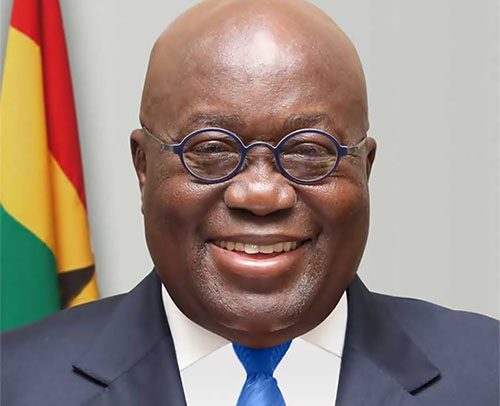President Nana Akufo-Addo
The Electoral Commission (EC) has gazetted the 2020 presidential election results declared by its Chairperson, Jean Mensa.
The gazette notification was done at the Assembly Press in Accra on Thursday, December 10, 2020, in accordance with the Declaration of President-elect Instrument 2020, C.I. 135 under the hand of the EC Chairperson who is the Returning Officer of the presidential election.
The EC move gives official legal backing to the results as declared last on Wednesday, December 09, 2020 following the Monday, December 07, 2020 voting.
President Nana Addo Dankwa Akufo-Addo of the New Patriotic Party (NPP), according to the EC, polled 6,730,587, representing 51.303%, to beat former President John Dramani Mahama of the National Democratic Congress (NDC), who garnered 6,213,182, which represents 47.359%, in the eighth election of the Fourth Republic.
Gazette Notification
The Declaration of President-elect Instrument 2020, C.I. 135 as signed by the EC boss on Wednesday, December 09, 2020, said “Nana Addo Dankwa Akufo-Addo, the NPP Presidential Candidate having, in the presidential election held on the December 7, 2020, pursuant to Article 63(3) of the Constitution, obtained more than 50% of the total number of valid votes cast is hereby the President-elect of the Republic of Ghana.”
Gazette Implication
The declaration has paved the way for President Akufo-Addo to start a second term mandate on January 7, 2021 and as part of the process, the President has since named a transition team in consonance with the provisions of Presidential (Transition) Act, 2012, (Act 845).
With the gazetted results, any candidate aggrieved by the declaration by the Returning Officer and determined to mount any legal challenge can now proceed to do so at the Supreme Court.
The EC, by Constitutional Instrument (CI) 127, Regulation 44, Sub-regulation 11, is mandated to gazette the results.
Legal experts have said without the gazette of the results, anybody mounting a legal challenge would be thrown out by the court.
“An instrument, which is executed under the hand of the Chairman of the Commission and under the seal of the Commission; and states that the person named in the Instrument was declared elected as the President of Ghana at the election, is prima facie evidence that the person named was elected,” a source said.
The C.I. stated that the instrument referred to in sub-regulation 11 should be published in the Gazette.
21 Days mandate
The source said any person or group of persons interested in contesting the results have up to December 30, to mount the challenge.
“It is a public notice that states that there had been elections and of the 12 candidates that contested, Nana Addo Dankwa Akufo-Addo has been duly elected as the President.
“The process is just like a newly wedded lady who wants to change her maiden name to her husband’s surname. You go to the Assembly Press and pay a fee for it to be published,” the source said.
42 Days Trial
Ahead of the election on December 7, the Judicial Service launched the fourth edition of a manual on election adjudication.
The manual is to provide a source for all requisite constitutional provisions on the conduct of presidential and parliamentary elections including statutory and subsidiary legislations as well as relevant and special procedural rule on the conduct of these elections.
Speaking at the launch of the Manual on Election Adjudication, Supreme Court judge, Justice Jones Victor Dotse, who was Chairperson of the Election Manual Review Committee, had said that the revised edition of the manual includes C.I. 99 which ensured that any petition arising from the presidential election result would be resolved expeditiously within 42 days.
He had said this was necessitated by the delays occasioned by the 2013 presidential election petition which took almost nine months to adjudicate.
He also indicated that the changes in the fourth edition of the manual also spelled out who could initiate a petition against the result of the presidential election.
“There are major significant changes in the law, in the sense that now if you are interested in questioning or initiating a presidential election dispute, you must have been a candidate in that election, and you can only sue the one who has been declared as the winner by the EC and the EC. That is all,” Justice Dotse had said.
EC Website
On the EC website, the commission has published details of every pink sheet used in the election in all the polling stations.
Parliamentary Results
On Monday, the commission officially confirmed the number of seats won by the political parties in the just ended general election.
A statement issued by the EC had affirmed that the NPP had 137 seats followed closely by the opposition NDC with 136 and a seat for an independent candidate who won a seat in Fomena in the Ashanti Region.
“The EC wishes to inform the general public that following the 2020 presidential and parliamentary elections held on December 7, 2020 273 seats have been declared in favour of the NPP and the NDC and an independent candidate.
According to the EC, “the Sene West parliamentary election is yet to be finalized and the outcome declared;” adding “the commission assures the general public that it is working to finalize the issues regarding the Sene West Constituency to enable the transparent, fair, credible and peaceful conclusion of the process. We expect finality to this issue within the shortest possible time.”
“Additionally, the EC is aware of contests to some parliamentary seats by both the NPP and the NDC in a number of constituencies. We entreat the political parties to use the laid down processes established by law to seek redress to their concerns,” it stated.
By Ernest Kofi Adu


